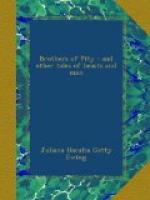There are fields and fields. I never wish to know a better field than this one. I seldom go out much till the evening, but if business should take one along the hedge in the heat of the sun, there are as juicy and refreshing crabs to be picked up under a tree about half-way down the south side, as the thirstiest creature could desire.
And when the glare and drought of midday have given place to the mild twilight of evening, and the grass is refreshingly damped with dew, and scents are strong, and the earth yields kindly to the nose, what beetles and lob-worms reward one’s routing!
I am convinced that the fattest and stupidest slugs that live, live near the brook. I never knew one who found out I was eating him, till he was half-way down my throat. And just opposite to the place where I furnished your dear mother’s nest, is a small plantation of burdocks, on the underside of which stick the best flavoured snails I am acquainted with, in such inexhaustible quantities, that a hedgehog might have fourteen children in a season, and not fear their coming short of provisions.
And in the early summer, in the long grass on the edge of the wood—but no! I will not speak of it.
My dear children, my seven dear children, may you never know what it is to taste a pheasant’s egg—to taste several pheasant’s eggs, and to eat them, shells and all.
There are certain pleasures of which a parent may himself have partaken, but which, if he cannot reconcile them with his ideas of safety and propriety, he will do well not to allow his children even to hear of. I do not say that I wish I had never tasted a pheasant’s egg myself, but, when I think of traps baited with valerian, of my great-uncle’s great-coat nailed to the keeper’s door, of the keeper’s heavy-heeled boots, and of the impropriety of poaching, I feel, as a father, that it is desirable that you should never know that there are such things as eggs, and then you will be quite happy without them.
But it was not the abundant and varied supply of food which had determined my choice of our home: it was not even because no woodland bower could be more beautiful,—because the coppice foliage was fresh and tender overhead, and the old leaves soft and elastic to the prickles below,—because the young oaks sheltered us behind, and we had a charming outlook over the brook in front, between a gnarled alder and a young sycamore, whose embracing branches were the lintel of our doorway.
No. I chose this particular spot in this particular wood, because I had reason to believe it to be a somewhat neglected bit of what men call “property,”—because the bramble bushes were unbroken, the fallen leaves untrodden, the hyacinths and ragged-robins ungathered by human feet and hands,—because the old fern-fronds faded below the fresh green plumes,—because the violets ripened seed,—because the trees were unmarked by woodmen and overpopulated with birds, and the water-rat sat up in the sun with crossed paws and without a thought of danger,—because, in short, no birds’-nesting, fern-digging, flower-picking, leaf-mould-wanting, vermin-hunting creatures ever came hither to replenish their ferneries, gardens, cages, markets, and museums.




